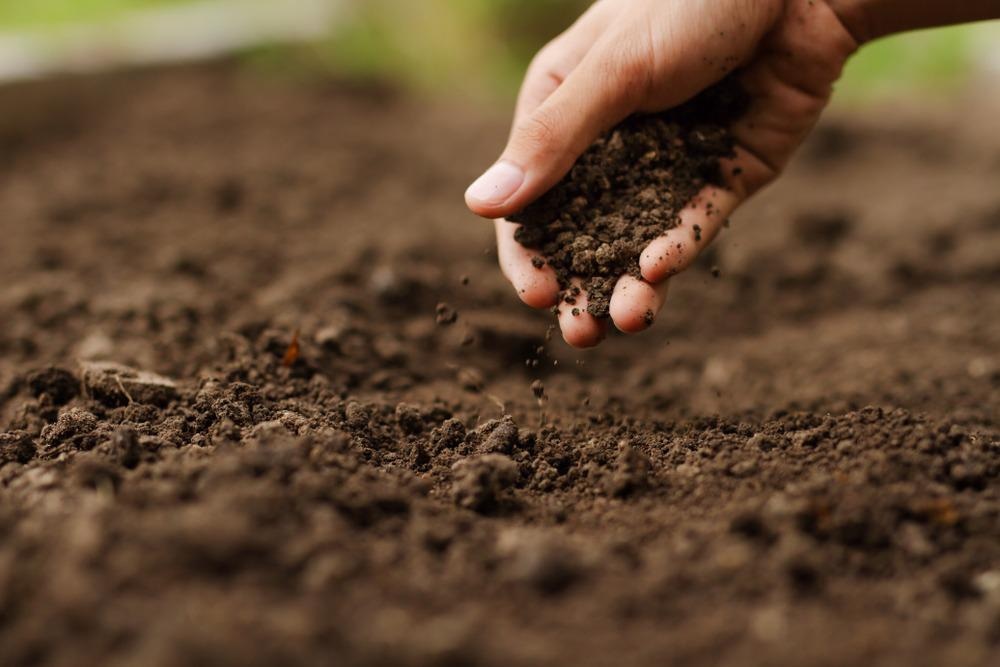Titanium dioxide (TiO2) nanoparticles (NPs) are the most extensively utilized nanomaterial, and their increased usage raises issues about their potential influence on the soil environment. A recent paper submitted to the journal Chemosphere assessed the possible effects of low-dose TiO2 nanoparticles on the biochemical characteristics of the soil.

Study: Interaction of TiO2 nanoparticles with soil: Effect on microbiological and chemical traits. Image Credit: Piyaset/Shutterstock.com
Impact of Nanoparticles on Rhizosphere
The rhizosphere is a bioactive environment that consists of a thin layer of soil adhering to the root system surfaces in the subsurface's unsaturated zone. The rhizosphere is home to a large number of valuable microbes, and interactions between bacteria and plant surfaces are crucial for the proper operation of nutrient cycles.
The rhizosphere's integrity is critical for plant development, and any external agent that interferes with rhizosphere functioning may affect plant growth. Nanoparticles absorbed from various sources may have a profound influence on the form and function of soil microbial communities.
What are Titanium Dioxide (TiO2) Nanoparticles?
Titanium dioxide nanoparticles are particles having a size smaller than 100 nanometers, finding use in a wide range of advanced applications, including photoconductive construction, photochemical breakdown of contaminants, water filtration, biomedical sensors, and drug delivery systems.
Agricultural nanotechnology applications of TiO2 nanoparticles as a non-nutrient fertilization agent are still in their infancy. Previous research has confirmed that TiO2 nanoparticles have a dual influence on soil microbial communities, i.e., both beneficial and detrimental effects. As a result, the impact of TiO2 nanoparticles on the biochemical properties of soil must be properly explored.
Importance of Soil Microorganisms
Soil microorganisms are critical regulators of soil biochemical processes. By affecting soil moisture condition, total suspended solids, total oxygen consumption, electrical properties, soil enzyme activity, and accessible organic fertilizers, the presence of tailored titanium dioxide nanoparticles in soil may influence bacterial diversity and community functioning.
The influence of TiO2 nanoparticles on soil microbial populations, plant development, and nutrient absorption has been documented previously. A few studies have also shown that the treatment of TiO2 nanoparticles influences the nutrient supply in the soil. However, these studies do not present a complete methodology for assessing the effect of low concentrations of TiO2 nanoparticles treatment.
Effect of Low Concentrations of TiO2 Nanoparticles on Soil Chemistry
In this study, the researchers focused on the impact of low doses (up to 20 mg/L) of TiO2 nanoparticles on the chemical and biological attributes of mungbean cultivated soil. To understand the impact of NP treatment, several biochemical, microbial, and enzymatic variables of the soil were examined at different time intervals.
Additionally, a quantitative reverse transcription chain polymer reaction (RT-PCR) investigation was conducted to determine the proportional changes in the expression of N-transformation-related genes in the soil ammonia oxidizer and nitrogen-fixing bacteria.
Important Findings of the Study
The researchers discovered that applying TiO2 nanoparticles in small doses improved the chemical characteristics and nutrient availability of the soil. Increased nutrient availability due to the application of TiO2 nanoparticles led to an increase in nutrient absorption by the plants. Additionally, treatment with TiO2 nanoparticles at low levels (up to 10.0 mg/L) enhanced soil microbial activity and enzyme concentration.
The quantitative RT-PCR analysis demonstrated that the reverse transcription of ammonia oxidizers was incompatible with the cell viability of ammonia oxidizers. The rise in fold change could be due to the presence of nonculturable and unfavorable bacteria in the soil.
A correlation investigation of several soil components found a positive correlation between protease and urease production. Protease is a digestive enzyme that aids in the breakdown of protein complexes into amino acids.
Future Perspective
The study's results indicate that TiO2 NPs can improve nitrogen recycling in the rhizosphere soil. Additionally, the NPs stimulate ammonia oxidizers in the soil. Thus, treatment of TiO2 NPs at small concentrations may enhance overall soil quality, and their regulated usage as a nano nutrient fertilizer for crop development has significant potential for future applications.
Reference
Kaur, H., Kalia, A., Sandhu, J. S., Dheri, G. S., Kaur, G., & Pathania, S. (2022). Interaction of TiO2 nanoparticles with soil: Effect on microbiological and chemical traits. Chemosphere: https://www.sciencedirect.com/science/article/pii/S0045653522011225?via%3Dihub
Disclaimer: The views expressed here are those of the author expressed in their private capacity and do not necessarily represent the views of AZoM.com Limited T/A AZoNetwork the owner and operator of this website. This disclaimer forms part of the Terms and conditions of use of this website.